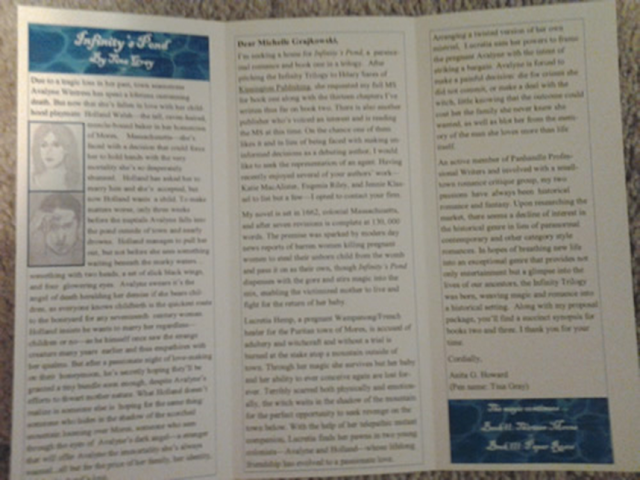
I learned a lot while querying literary agents. Here are the top five things I wish the younger me had known, so that other aspiring writers might learn from my mistakes:
1. The only way a query letter to agents should stand out is via a unique story premise and polished writing. Everything else needs to be standard and professional.
When I started constructing queries for the first book I ever wrote, I read lots of books and articles on how to go about it. One of them suggested you do something out of the ordinary to get noticed. So, I decided to make a query brochure — trifold and in full color — that had pictures of my characters, a short synopsis, an excerpt from the book, a headshot, and an author’s bio (under a pseudonym, thankfully!). You might’ve already guessed this, but I didn’t get many responses. I’m so glad I only sent out a handful.
2. Finishing one book does not equate instant success.
I just knew the first agent who read my three-page query letter (far too long, as I would later learn) would want to represent my completed manuscript. In truth, I got over one hundred rejections before I ever learned how to write a query letter to begin with. I once laid out the rejections I received, and they spanned from one end of my house’s hallway to the other. It took that many for me to realize that if I wasn’t going to get in the door with book one, it was time to write another.
3. Agents are not out to destroy your dreams.
Very early on, I did a post on my old blog questioning the form rejections writers receive, even using some of mine as an example — omitting names, of course. A savvy fellow blogger (who happened to be an assistant for an agent) pointed out that it might not be the smartest move, considering if any agents checked out my blog, they might be offended. She helped me see that agents are in this for the same reason as writers: we all want to get the books we love published. But agents are human; they have limited time, ergo, they have form letters to help them do their jobs. Treat them with respect if you expect it in return.

4. Even once you get an agent, you might not have them for life, they might not love everything you write, and you most likely won’t be published within months of signing.
Now, this isn’t true for everyone, but it was for me. Sometimes we don’t find our literary soulmates until books two, three, four, or — in my case — seven. What’s important is the willingness to keep writing. Make changes that resonate but stay true to your voice and vision. Have the courage to do what’s best for your long-term career and the confidence to move on if you know your agent doesn’t share your vision for your stories and voice.
5. Even if an agent turns you down the first time, you can query them again with another work down the road.
Refer back to that long line of rejections that lined my hallway . . . one of those came from my present agent. We’ve discussed it since, and she didn’t remember that I sent her a query for my first adult fantasy, or that she had turned it down because she didn’t love the writing. Thinking that meant she’d never want to see anything else I wrote, I made a point not to query her with my young adult debut, Splintered, some six years later. I queried her colleague instead. Had said colleague not referred my Alice in Wonderland spin-off to my present agent, I wouldn’t be where I am today. An agent’s tastes can change over time, just as your writing will. Never be afraid to try an agent again if you have a few more books under your belt. Chances are, one of you has changed enough to make a connection.








Comments
Post a Comment